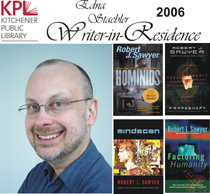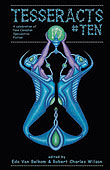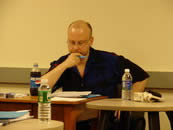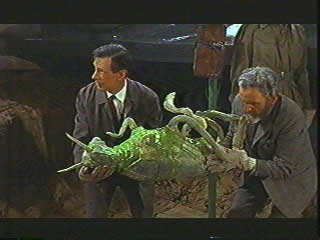Calculating God 7th printing

I'm pleased to note that my novel Calculating God is now in its seventh mass-market paperback printing.
Library Journal on Wake: "Sawyer's erudition, eclecticism, and masterly storytelling make this a choice selection."


... but it isn't. Mobipocket's Ultimate Handheld Classic Library.




A legally blind US reader sent me an email urging me to have my books made into commercial audiobooks, and to also have them produced as talking books by the US National Library Service for the Blind; she also suggested who she thought would make a great narrator. Here's what I had to say in reply; it pretty much applies to all modern SF writers whose names aren't Asimov, Bujold, Card, Clarke, Crichton, Heinlein, or Herbert <grin>:
Believe me, I wish my books were available on commercial audio, but I have no say in the matter. Most of the authors done as audio books are New York Times bestselling authors -- and I (and most SF writers) are a long way from being one of those.
My publisher -- not me -- controls the audio rights to my books, and the publisher would gladly license those rights to anyone who was willing to purchase them. But although you're correct that the audio book market is growing, it's still less than 5% of the print book market in unit volume, and so only books selling huge numbers of copies in print are attractive to audio-book publishers. And, I must say, even if my books were produced in audio format, I'd have no say in who did the narration; that would be entirely up to the company licensing the books.
Actually, one of my books IS available unabridged commercially on cassette: The Terminal Experiment, from Recorded Books. But that's the only one, and it was done almost a decade ago. You can find out about it here.
As for the National Library Service for the Blind, again, I have no control over what books they produce. Almost all authors, myself included, give permission in their publishing contracts for their books to be read for free on audio for the visually impaired -- beyond that, it's up to the Library Service to actually do it; I've already given the permission.
As you've discovered, in my native Canada, most of my books ARE available as talking books from the Canadian National Institute for the Blind (CNIB). I'd suggest you ask the National Library Service in the US either if they could get the CNIB editions for you, or if they'd do their own; as I said, I've already signed the contracts that give them the permission to do so, so they just have to learn that there's a demand for my books. <grin>
Many thanks for your kind words!

The Chicago Manual of Style is the bible for how text is presented in books. The Fourteenth Edition (section 5.4) says this: "Generally, punctuation marks are printed in the same style or font of type as the word, letter, character, or symbol immediately preceding them."
Smith played the title role in Hamlet, Macbeth, and King Lear; after his final performance, during which many in the audience wept, he announced his retirement.
Many editors admire Wired Style: it is both elegant and easy to use.
An Apache Life-way: The Economic, Social, and Religious Institutions of the Chiricahua Indians
Are you saying the wound was self-inflicted?
She is the author of What Next?
For light entertainment he reads King Lear!
The manual Online! is always at my elbow.
We heard his cries of "Help!"




A letter I received today:
Hello Mr. Sawyer. I noticed your website while I was online and searching for ways to start publisizing my book before completion. The most common problem that I run into is the fact that most publsists only want to deal with nonfiction first time authors only, not fiction.
Dorrence publishing told me after review of a rough, unedited copy of my book that they want to publish it. I'm assuming they only want to make money but they also stated theire reasons why. But the truth is I want to publish with my own Isbn Number. I'm not worried about spending money because i have to to learn what I need to know. I would like to have a consultation with you over the phone and I mostly want to learn how I as A fiction Author can successfully approach a Radio or TV station that will want to hear about my fiction book because it is so irritating when they won't just because of it's genre.
After copyrighting it I let many people read a rough copy of it and guess what upon publication they all want to buy a copy. So truthfully it only matters what those people think and they are the ones buying not the publisits.
Thankyou for reading my email I was only expressing how much I need your help. Your a fiction author that has already gotten through all of this, so I really need your advice sir. please email me or give me a call thankyou sir.



Can I pick 'em, or what? Another rave review for Nick DiChario's A Small and Remarkable Life, published under the Robert J. Sawyer Books imprint of Red Deer Press.
The Robert J. Sawyer Web Site
Over at FictionRight.com, Alan and Rebecca Lickiss interview Judith and Garfield Reeves-Stevens and Robert J. Sawyer. The three provide information and advice for writers of all levels. Run-time: 35 minutes. stream the audio or download the MP3 directly here.


